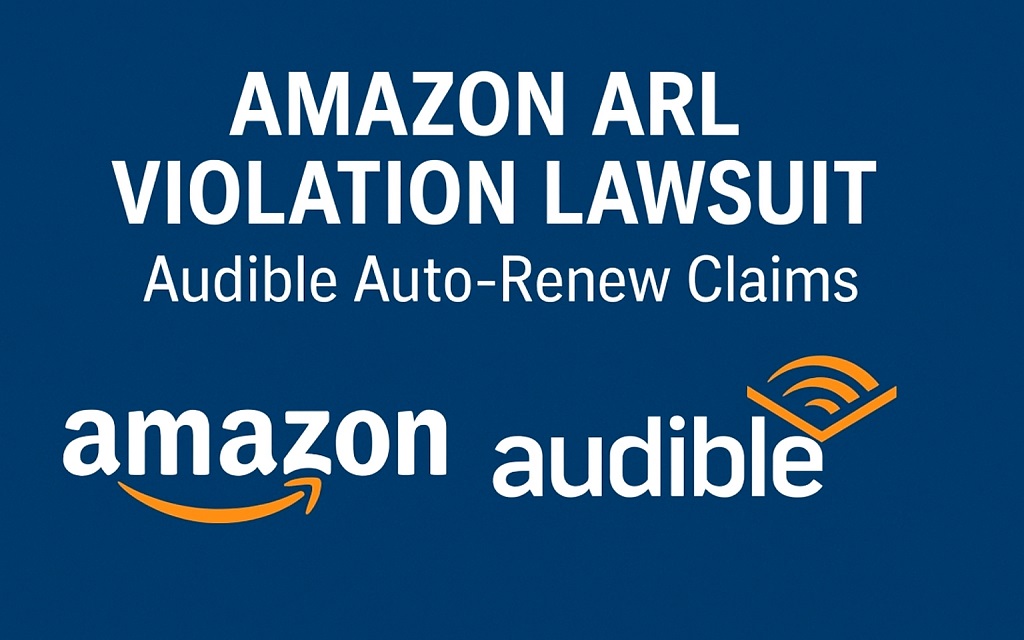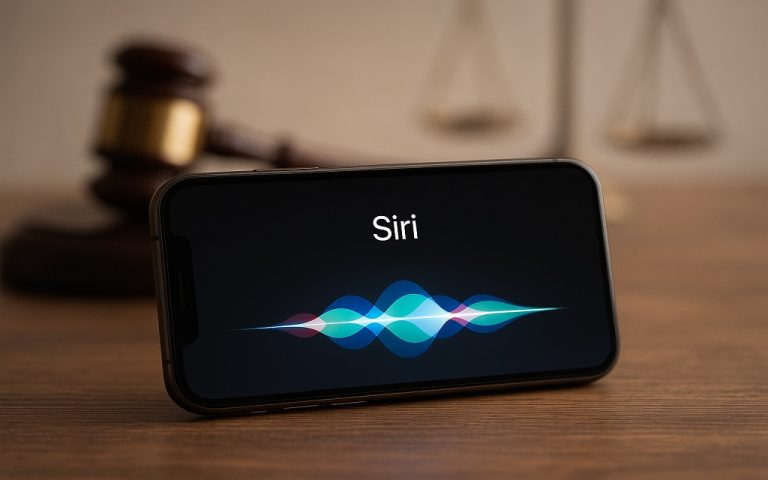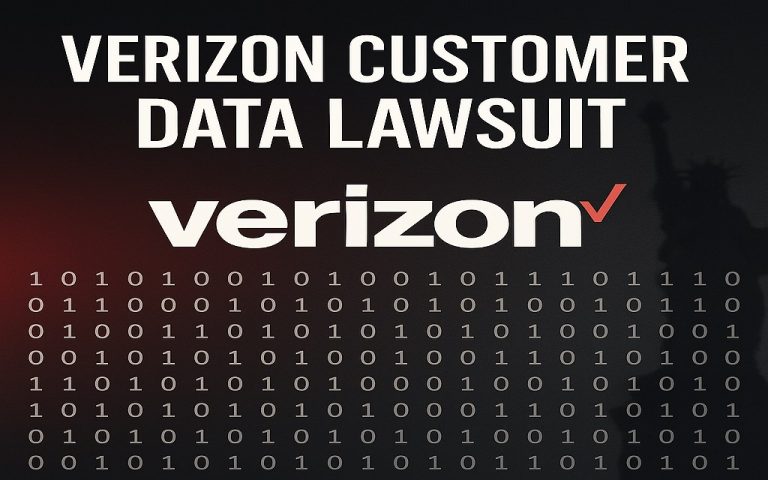You should pay close attention to the ongoing Amazon ARL Violation Lawsuit. Audible and its parent company, Amazon, now face serious claims that they enrolled users into paid subscriptions without proper consent. The lawsuit focuses on California’s Automatic Renewal Law, which protects you from hidden charges and hard-to-cancel services.
The Amazon ARL Violation Lawsuit accuses both companies of using stored payment data to auto-enroll users in Audible without explicit approval. Many consumers said they never saw the complete terms or clicked a button to accept recurring charges. Others said they never received emails explaining how to cancel.
However, you should understand that the Amazon ARL Violation Lawsuit could bring significant changes to how subscription services operate. If the court rules in favor of users, Amazon may need to refund charges, redesign its billing pages, and fix how Audible handles email confirmations.
This article breaks down each part of the case so you can protect your rights, avoid unwanted renewals, and understand what happens next. You deserve full control over your subscriptions. This lawsuit may help enforce that.
What Is the Amazon ARL Violation Lawsuit and Why Does It Matter?
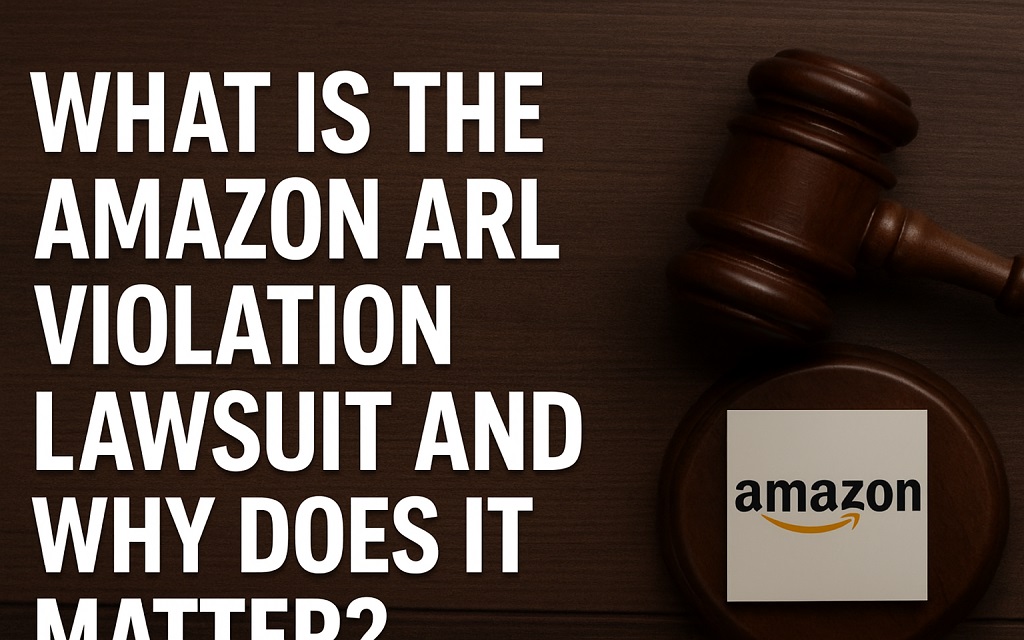
You need to know that Amazon and Audible face multiple lawsuits under California’s Automatic Renewal Law (ARL). The claims target how Audible enrolls users into paid subscriptions. The lawsuits allege that users never consented clearly. Many users say they never saw the full renewal terms. However, others say Audible used saved payment details from Amazon purchases without permission.
Therefore, it is essential to know that ARL violations carry serious consequences. Plaintiffs can demand refunds, statutory damages, and court-ordered changes. Class action lawsuits make those demands even stronger. Audible users in California form the core group of claimants. Some users in other states also joined.
Court records from the Western District of Washington confirm that the case survived Amazon’s attempt to dismiss it in early 2025. The judge ruled that the allegations raised valid legal questions. The plaintiffs said they received no clear disclosures. They said they did not give affirmative consent. They also described difficulty in canceling Audible once enrolled.
A second lawsuit in New Jersey includes similar claims. It describes how users get auto-enrolled in Audible after making unrelated purchases on Amazon. That complaint highlights the use of pre-saved payment information. Many users said they never saw a sign-up screen.
However, it is essential to closely monitor cases like these, as subscription billing affects millions of consumers. You may be enrolled in a similar service without realizing it. The court’s decision could shape future standards for online consent, transparency, and cancellation. The Federal Trade Commission (FTC) already raised concerns. Its lawsuit against Amazon in 2023 addressed similar Prime subscription practices.
So, you should expect more scrutiny of digital subscriptions. Companies may have to redesign flows. Legal compliance with ARL will remain under the spotlight.
Must Read: Alexa Wiretap Lawsuit: What It Means for Your Privacy
How Does California’s Automatic Renewal Law Protect Consumers?
First of all, you should understand the full scope of California’s ARL. The law protects you from surprise charges linked to auto-renewing subscriptions. The statute applies to both digital and physical goods. Because it affects companies offering free trials or paid recurring services.
So, it is essential to know the five key requirements under California’s ARL:
- Disclose all renewal terms before purchase
- Get affirmative consent before charging
- Send an email confirmation after sign-up
- Offer a simple cancellation process
- Provide notice before billing after free trials or changes
Firstly, you need to see those terms clearly before you make a payment. The law says companies must use bold text, pop-ups, or equivalent design methods. Hidden footnotes do not qualify. Links placed behind small icons also fail legal tests. The design must grab your attention.
Affirmative consent means you must take explicit action. So, you may need to check a box or click a separate “I agree” button. The law rejects passive or implied consent. Moving forward in a checkout process does not count as a legal agreement.
However, you must receive an email receipt. That message needs to contain the exact terms of the deal. It also must explain how to cancel. Some users in the Audible case said they never got those emails. On the other hand, others said the emails had no applicable cancellation instructions.
You should also have an easy way to cancel. Companies must not hide the cancel button. In fact, Audible users complained of long cancellation flows. The FTC described similar complaints about Amazon Prime in its 2023 filing.
A 2021 study by the National Consumers League found that 42% of consumers failed to cancel free trials in time. Most said they did not realize they had signed up for the program. However, others said they could not find the cancel option.
Additionally, California’s ARL places the burden on the business. You should not have to fight your way out of a subscription. You should get clear terms up front. Audible and Amazon must meet that standard if they operate in the state of California.
What Are the Allegations Against Amazon and Audible in the Audible Auto-Renewal Lawsuit?
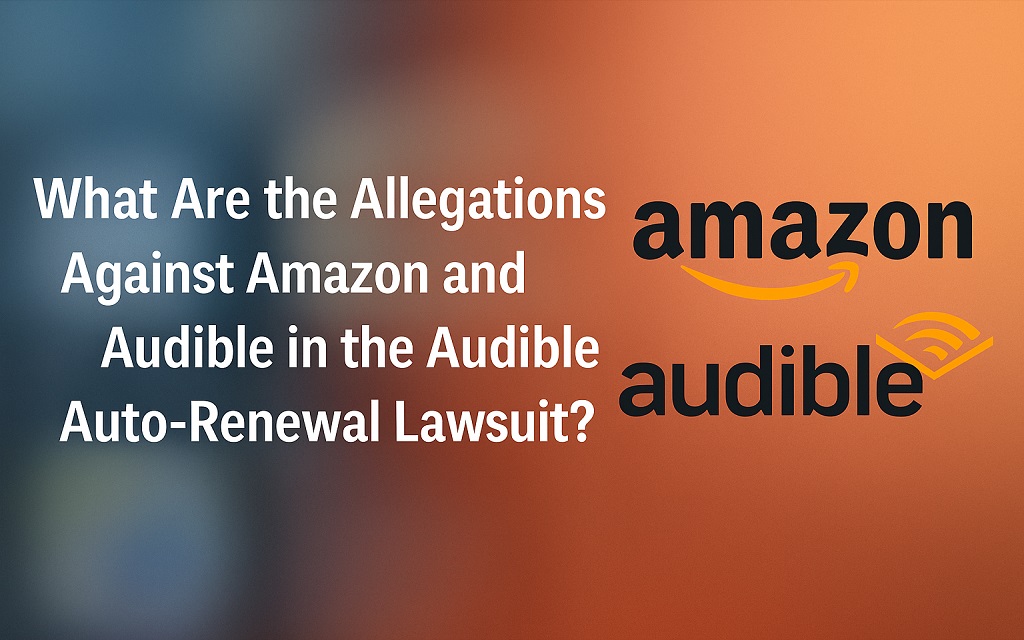
You should know the claims focus on deceptive enrollment. Audible allegedly used stored Amazon data to activate new paid plans. However, the lawsuits say users never gave permission. They also claim that Amazon failed to follow the law at key points in the subscription process.
However, it is crucial to understand how the complaint outlines each violation:
- Audible did not display renewal terms before billing
- Audible failed to obtain affirmative consent to renew
- Audible used stored payment details without new approval
- Audible did not send proper email confirmations
- Audible made cancellation difficult
Anyhow, you may wonder how that works in practice. Here’s an example. A user buys a book on Amazon. Later, that user browses a product linked to Audible. A pop-up offers a “free trial” of Audible Premium Plus. The user clicks yes. Behind the scenes, Amazon applies the user’s stored credit card; Audible charges $14.95 per month after seven days. The user receives no upfront warning. However, the renewal terms remain buried in small text or tooltips.
Besides, you should also pay attention to the design of the consent mechanism. The lawsuit states that Audible lacks a clear check box or click-to-confirm element. Users never see the word “auto-renew” before accepting the offer. California law requires that the disclosure appear clearly and before payment.
Therefore, you may think the email confirmation would be helpful. But the plaintiffs argue it lacked cancellation instructions. Some users say they got no message at all. Others say the email looked like a regular Amazon receipt.
The cancellation path matters too. The law says companies must provide a way to cancel “immediately and easily.” Screenshots from the Audible platform show a four- to six-step process. One user said she clicked three times before finding the “end membership” option. However, others said they landed on a page offering retention discounts instead of completing the cancellation request.
Amazon disputes the claims. The company argues that its flows meet legal standards. It also says that many users continued using Audible after enrollment. That could undercut allegations of deception. Still, the court allowed the case to move forward.
According to a 2022 report from the FTC, improper auto-renewals cost U.S. consumers over $1.2 billion annually. The Audible lawsuit places Amazon among the major players facing legal heat in that space.
How Do Courts Define “Clear and Conspicuous” Under ARL?
Firstly, you should know that courts enforce strict standards for clarity in subscription offers. The phrase “clear and conspicuous” has a legal meaning under California’s ARL. It requires companies to show terms in a way that you cannot miss. Fonts, colors, spacing, and placement all matter.
It is important to note that fine print does not meet the requirement. Courts rejected disclosures hidden behind hyperlinks or small tooltips. Terms placed below the checkout button also fail. Audible allegedly used all of those design patterns.
The California statute uses this standard to prevent silent enrollment. You must see the renewal terms before you pay. Courts expect bold text, high contrast, and strong visual placement.
In 2022, a California appeals court ruled against a subscription box company that used gray text on a white background. The court said that the design failed the “clear and conspicuous” test. The ruling emphasized user experience as a legal issue.
Screenshots in the Audible lawsuit show renewal terms in small text. Some links appeared in gray font. The placement fell below a call-to-action button. In many cases, the term “auto-renew” never appeared.
The FTC addressed similar design tactics in its 2023 action against Amazon. The agency said Amazon made it hard for Prime users to notice auto-renewal language. It cited the placement of disclosures near the bottom of long web pages. The Audible case includes similar allegations.
You need to understand that visual clarity shapes legal outcomes. Courts now analyze layout just as they analyze contracts. If the design hides material facts, the offer becomes invalid.
That means Audible’s checkout page must meet high design standards. The text must stand out. The words must match the legal definition. The placement must occur before any payment action. Failing that, the user never consents legally.
What Does Affirmative Consent Mean in Subscription Law?
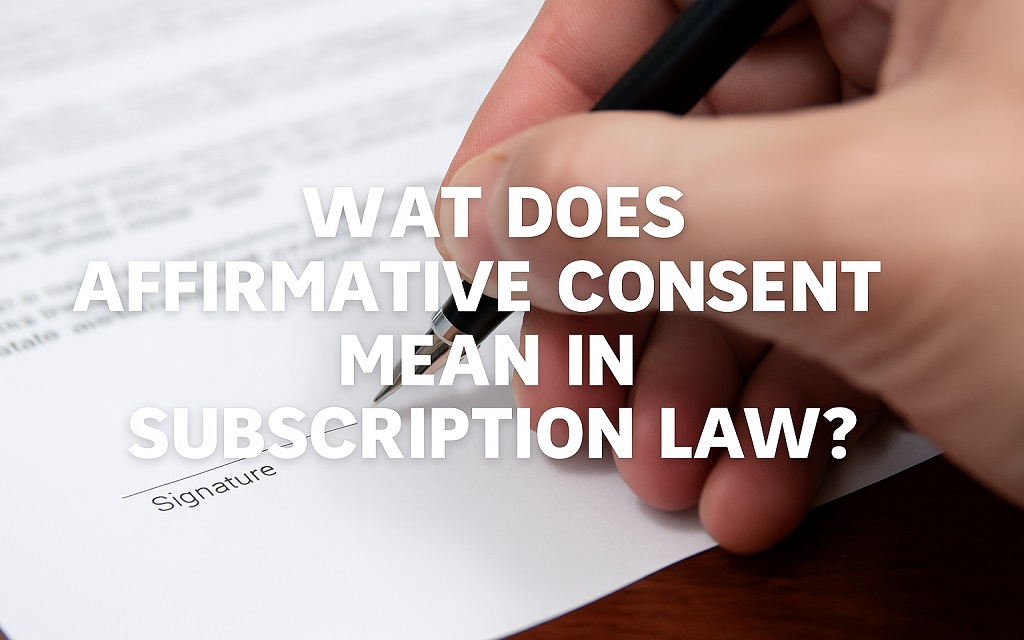
You should understand that affirmative consent requires explicit action on your part before a company can charge you for recurring services. Under ARL, consent must happen after full disclosure and before payment. It cannot be assumed.
It is essential to understand what constitutes affirmative consent. Acceptable actions include:
- Clicking a box that confirms agreement to auto-renewal terms
- Tapping a button labeled “Start paid subscription”
- Signing a digital agreement that mentions recurring charges
- Taking any step that signals full awareness of renewal terms
Audible’s process allegedly lacked all of those. According to the complaint, users clicked a button offering a free trial. The screen did not mention automatic billing. No separate checkbox appeared. The term “recurring” never showed up. The action felt like accepting a sample, not signing a contract.
Legal standards reject passive consent. That means silence does not qualify. Continuing to browse does not count. Proceeding to the next page without an opt-in checkbox fails the test. Courts expect a clear link between the action and the consent.
A 2021 court ruling in Lozano v. RetailMeNot confirmed that clicking “Continue” after vague disclosures did not equal consent. The court said ARL demands clarity and action. Anything less creates a deceptive transaction.
You must know that the burden lies with the company—Audible needs to prove that you saw the terms and agreed. The complaint says that never happened. Users never clicked a consent box. Audible never displayed the price on the confirmation page.
The FTC defines affirmative consent in similar terms. Its guidelines say that buttons must use unambiguous language. The design must not mislead. Users must understand the deal before they click.
Audible’s sign-up flow may fail on all those counts. If the court agrees, Amazon could face significant liability.
Why Are Cancellation Pathways a Key Legal Issue?
You should know that the ability to cancel easily is not just a convenience. It is a legal right under ARL. The law says that consumers must get a “simple, cost-effective, and immediate” way to cancel. That applies to all subscription services, including Audible.
It is important to note how Audible allegedly handled cancellations. Many users reported having to navigate through multiple screens. Some clicked “Cancel” only to see retention offers. Others ended up on unrelated help pages. A few had to contact customer support directly.
Legal cases focus on user flow. If you need to click more than twice, courts may rule that the process is not “simple.” If the cancel button leads to other offers first, the process fails the “immediate” standard.
In 2023, the FTC cited Amazon’s cancellation process for Prime as an example of dark patterns. The agency said users had to pass through four screens before they could cancel. Audible allegedly uses a similar system.
Screenshots submitted in court show Audible users clicking “Cancel” only to reach a page titled “Keep Your Credits.” Another page offered a discount. The final cancel button appeared in small text below a larger “Continue Membership” button.
A 2022 survey by Consumer Reports found that 36% of users who tried to cancel a subscription failed. The most common reason was a confusing design. The second most common was being redirected multiple times.
You should not face obstacles when trying to cancel a paid service. The law stipulates that the process must be direct and swift. Email cancellations must be processed promptly. In-app buttons must work on the first click.
Audible may need to redesign its cancellation flows. Failure to comply can lead to injunctions. Courts may force changes in layout and wording. Refunds may also follow.
You have the right to cancel without stress. Audible’s design will face legal testing on that basis.
What Role Does Stored Payment Data Play in ARL Violations?
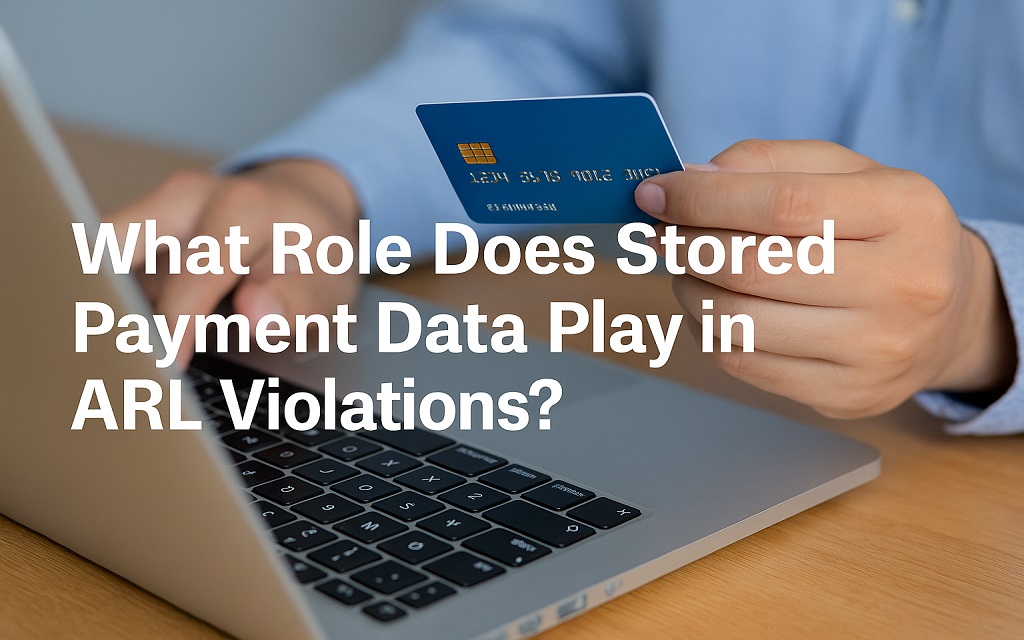
Please note that using stored payment data without permission can create legal issues. The Audible lawsuit alleges that Amazon utilized stored credit card information from unrelated transactions. That data activated a new Audible subscription without your consent.
It is crucial to understand how this violates ARL. The law requires businesses to get permission before charging your card for recurring services. That consent must follow disclosure. It cannot rely on prior authorization for a different transaction.
Audible users reported that they clicked on a free trial button. They never entered new payment details. The system auto-filled the billing process using stored Amazon account data. That action occurred without any prompt or verification. The lawsuit says that it violates both ARL and general contract principles.
A 2023 complaint filed in the District of New Jersey said the same thing. Plaintiffs in that case claimed that Audible enrolled them without ever seeing a billing page. The platform used credit cards saved from book purchases or past orders.
You should understand that courts look at each step in the process. If the subscription starts without a new billing authorization, it fails legal review. The Federal Trade Commission agrees. Its 2023 enforcement guidance says companies must not rely on passive billing using stored credentials.
A 2022 research brief from the Better Business Bureau showed a 31% rise in complaints about unexpected recurring charges. Most involved platforms that reused payment data across different services.
You may feel surprised to learn that companies can connect services like that. But the law draws a clear line. ARL states that the transaction must start anew. Users must see the renewal terms. Users must approve the use of payment details. No link between past and present purchases changes that rule.
Amazon faces central legal pressure for this practice. The court may decide that stored data cannot create consent.
How Do Courts Evaluate Email Confirmations Under ARL?
You should know that an email confirmation is not optional under California’s ARL. The law requires that you receive an acknowledgment after signing up for a subscription. That message must include the key terms and a precise cancellation method.
It is vital to check what Audible sent after enrollment. The lawsuit says many users received vague or generic emails. Some got no email at all. Others saw receipts that appeared to be normal Amazon purchase confirmations. Those emails lacked cancel buttons or terms of service.
The California statute requires more. An email must include:
- The exact name of the service
- The renewal frequency and price
- The cancellation steps in detail
- A working link to cancel (if the platform is online)
- Any limits on refunds or credits
You should expect complete transparency. A court will review the emails sent by Audible. If they fail to meet the list above, they may count as evidence of ARL violations.
A 2021 case in the Central District of California ruled against a media company that omitted cancellation links in its email confirmations. The court said the emails created confusion and denied consumers a fair way out. Audible’s emails may face the same scrutiny.
You should be aware that emails play a crucial role in the subscription record. The burden falls on the company. It must prove that you received an email. It must also prove that the email met ARL standards.
Some Audible users said their emails had no mention of renewal. Others said the message went to spam. The court may consider those details. Failure to deliver or format the confirmation correctly counts as a violation.
Audible must fix its email system if the court finds legal fault. The design, content, and timing of confirmation emails now play a central role in subscription compliance.
Must Read: Amazon Class Action Lawsuit: Eligibility, Refunds, Deadlines & More
What Legal Remedies Are Audible Users Demanding?
You should understand that users who join a class action can ask for several types of relief. The Audible lawsuits demand both financial compensation and permanent policy changes. The court can grant any or all of them if it finds Amazon liable.
It is essential to review the remedies listed in the complaint:
- Full refunds of all unauthorized charges
- Restitution of money collected without proper consent
- Statutory penalties under California law
- Injunction to stop illegal practices
- Court order forcing new disclosures and email formats
- Reimbursement of legal fees
You may qualify for compensation if you were enrolled in Audible without your agreement. If the class gets certified, you will likely receive notice. That notice will explain your right to join or opt out.
California law allows $100 per violation in some ARL cases. That number may rise based on the company’s revenue. Courts also approve settlements that return money to users as part of a refund pool.
A 2020 class action settlement involving Match.com awarded refunds and required the company to redesign its subscription flows. That outcome followed an ARL-based claim. Audible users seek the same type of result.
The lawsuits also demand an injunction. That means a court order forcing Audible to redesign its subscription pages. It may also force Audible to add cancel buttons and fix email language. You could see those changes even if you do not join the lawsuit.
You have a right to fair subscription terms. If the court agrees that Audible violated ARL, you may receive money and better digital protections.
How Could Class Certification Affect Audible Users?

You should understand that class certification decides who benefits from the lawsuit. If the court certifies the case as a class action, all qualifying Audible users may be eligible to receive compensation. Without class status, only the named plaintiffs receive relief.
It is crucial to grasp the rules for certification. Courts use specific tests under Federal Rule 23. The group must meet four main conditions:
- Common legal or factual issues across all members
- A large enough class to justify group treatment
- Claims are typical of the entire class
- Adequate representation by lead plaintiffs and attorneys
The Audible lawsuit aims to certify a class of California users. You may qualify if you live in California and were enrolled in Audible without explicit consent. Other users from different states may form subclasses later.
Certification allows the case to move toward a group remedy. That makes refunds and changes more likely. It also increases legal pressure on Amazon to settle or improve policies.
A 2021 case involving SiriusXM reached class certification based on similar claims. Plaintiffs said the company auto-enrolled users without clear disclosures. The court agreed that many users faced the same legal injury. That ruling helped consumers across several states.
You should know that once certified, the case gets wider media attention. It may also trigger regulatory reviews. State attorneys general and the FTC often review certified class actions for follow-up.
Audible will likely oppose class certification. The company may argue that users had different experiences. It may be claimed that some users accepted the terms knowingly. The court will examine records, email samples, and platform screenshots to decide.
If you receive a notice about class rights, you should read it carefully. You may have to file a claim later to receive any money. You may also need to keep billing records or screenshots as proof.
However, class certification opens the door to broad accountability. You could benefit if the court allows the case to continue as a group action.
What Are the Key Takeaways from Related Amazon Subscription Cases?
You should pay attention to other lawsuits that show patterns. Amazon faces similar claims in different courts. These cases provide insight into how Audible’s defense might evolve.
It is crucial to study the FTC’s 2023 lawsuit against Amazon. The complaint said Amazon used dark patterns to make Prime difficult to cancel. The agency focused on user interface choices. It said Amazon used misleading buttons and hard-to-find options. That case remains ongoing.
A second case from 2022 involved Amazon Prime in California. Users said the company did not disclose auto-renewal terms. But the court denied Amazon’s motion to dismiss. The judge said the claims supported an ARL violation theory.
In fact, you should connect that to the Audible case. Many of the same issues appear. Users claim that the sign-up page concealed key facts. Others report that the cancel button redirected them to upsell offers instead of terminating the plan.
In another 2024 filing, Sherk v. Audible, Inc., plaintiffs in New Jersey said Amazon used stored credit cards to enroll users. The complaint includes Amazon and Audible as joint defendants. It expands the legal exposure across states.
However, legal experts warn that these patterns could lead to long-term regulation. A 2023 law review article from UCLA said repeated violations by large tech firms show the limits of voluntary compliance. It called for stricter federal rules modeled on California’s ARL.
Besides, Amazon’s defenses remain consistent. The company claims users accepted the terms. It also states that interfaces adhere to standard design practices. But courts now treat UX patterns as legal facts. Design choices that confuse users can trigger liability.
You should expect more lawsuits tied to subscriptions. Amazon will likely review all services that involve recurring payments. Audible may not be the last to face legal risk.
How Can You Protect Yourself from Automatic Renewal Traps?

You should take steps now to avoid hidden charges. Auto-renewal services can cost you money each month. You may not notice until your account balance drops. Simple habits help you stay in control.
It is essential to do the following:
- Firstly, read all sign-up pages before accepting any free trial
- Next, look for renewal terms in bold or highlighted font
- Thirdly, avoid clicking “Continue” without checking the fine print
- Next, use a virtual credit card for trials when available
- Cancel at least 48 hours before a trial ends
- Remember, keep screenshots of every sign-up and email receipt
- Finally, set calendar alerts to track renewal dates
You should also check the stored payment methods in your Amazon account. Go to “Your Payments” and remove cards not in use. Review all active subscriptions under “Memberships and Subscriptions.”
Anyhow, if you find any charge from Audible that you do not recognize, file a dispute immediately. Contact Audible support first. If that fails, call your credit card provider. Federal law allows you to dispute unauthorized charges within 60 days.
You can also file a consumer complaint with the California Attorney General. The form appears on the state’s official site. Choose the “Auto-Renewal Complaint” option for faster review.
A 2023 survey by Pew Research showed that 38% of Americans had at least one subscription they forgot to cancel. The most common were digital media services. The average loss per person reached $197 annually.
However, Subscription rules now shift toward your side. Laws like California’s ARL give you the right to full disclosure, easy cancellation, and clear terms. You must stay alert and take action when you see signs of abuse.
So, you deserve transparency. Audible and Amazon must meet legal standards. Until then, protect yourself with good habits and timely review.
Conclusion: What Should You Expect Next in the Audible Lawsuit?
In short, you should expect the Amazon ARL Violation lawsuit to move forward. The court allowed the claims under California’s ARL to proceed. Audible now faces legal pressure to revise its subscription design and offer refunds to users.
However, it is essential to know that more users may join the lawsuit. If the court certifies the class, you could receive notice. So, you may qualify for compensation if Audible enrolled you without your explicit consent.
You should also watch for changes to Amazon’s policies. The Amazon ARL Violation lawsuit could lead to new rules for auto-renewal, more manageable cancellation steps, and better email confirmations.
However, this case highlights growing concern over subscription abuse. Courts and regulators want clear disclosures and real user consent. Audible must now defend its practices. You should review your subscriptions and protect your rights.
Anyhow, the outcome could improve how companies treat consumers. You deserve transparency, easy exits, and honest billing.
Disclaimer: This article provides a general overview of the Amazon ARL Violation lawsuit, based on publicly available information, and is intended for informational purposes only. It is not legal advice.
Musarat Bano is a content writer for JudicialOcean.com who covers lawsuits, legal news, and general legal topics. Her work focuses on research-based, informational content developed from publicly available sources and is intended to support public awareness. She does not provide legal advice or professional legal services.

